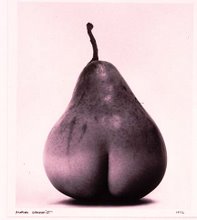
As I do love refuting the diatribe of pseudo-intellectuals, I just had to post this little gem.
Here's a copy of the original article in red italics: (download this article
here).
Language & Ecology Online Journal (2004) available from http:// www.ecoling.net/journal.html
[updated version Dec 2006]
Masculinity, health and ecological destruction
by Arran Stibbe
One important way that language is connected to ecology is through the discursive construction of gender. As ecofeminists such as Diamond and Orenstein (1990) and Adams (1993) show, there is a high correlation between patriarchal social structures and ecological destruction, and social structures are created, partially, through language. Discourses which play roles in constructing images of masculinity and femininity are all around, but for this article I will concentrate on one example: an instance of a particular discourse of masculinity which has been called ‘hegemonic masculinity’. In Stibbe (2004), I analysed the construction of hegemonic masculinity in the discourse of Men’s Health magazine, drawing out implications for the emerging concept of health. There other important implications, however, in terms of ecology, and this current article looks at discourse of Men’s Health magazine in terms of its ecological implications.
The covers of the magazine, seen by far more people than those who actually buy it, display a black and white picture of an 'ideal' man, and a series of short statements in various font sizes. The majority of these statements use the conventional syntax of lifestyle magazines to set up various goals for readers, such as being thin or being a great heterosexual lover (Lose your belly! Gold medal sex etc). These are treated as something which is obviously desirable, but they may be implicated more in creating desires than responding to already existing desires. For instance, men may not have realised before that it was desirable to ‘Add 2 inches to your chest!’.
Good health is strongly correlated to ecological sustainability: a diet consisting of local produced, varied, organic fruits and vegetables is as good for biodiversity and the land as it is for health, as is avoiding canned and processed food and walking instead of taking the car. However, rather than goals which simultaneous promote health and ecological sustainability, the main goal that the magazine sets up for readers is the achievement of a huge, muscular body. Clearly this goal is related to images of power and masculinity rather than health. The following are just some of the statements from the cover of the magazine:
l SOLID MUSCLE! l BIGGER BICEPS l BUILD THIS BODY [with arrow pointing at a huge torso] l A HARD BODY l gain muscle l FIND YOUR ABS! l ADD 2 inches to your chest l HARD MUSCLES FAST! l PACK ON MUSCLE! (Men's Health 06/2000 - 09/2001 covers)
Achievement of a huge, muscular body demands the wasteful consumption of large amounts of food, and the magazine recommends one kind of food over all others:
meat has big advantages over all other foods: It packs muscle-building protein… (Men's Health 2000: December:166)
Meat is loaded with the protein needed to build new muscle (Men's Health 2000:December:166)
The muscle stoker [recipe]…eat this meal and you’ll grow your biceps…That’s because the protein in the beef [1lb top London broil] helps to build new muscle tissue (Men's Health 2000:July/August:87)
make your meat beef and you’ll also get testosterone-boosting amino acids. Testosterone helps you lift more weight and build more muscle. (Men's Health 2000: November, p84)
The cause and effect relationship between been eating meat and growing muscle is clearly expressed in the expression 'muscle-building protein', as if the protein itself will grow muscle without any effort on the part of the person eating it. Likewise, 'protein' is the agent of the verb 'build' in 'protein...helps to build new muscle', rather than the reader. In 'eat this meal and you'll grow your biceps', the reader is the agent of 'grow', but the only activity that the sentence suggests is 'eat this meal'.
Despite the associated risks of heart disease and prostate cancer Men's Health is recommending the consumption of large amounts of red meat, in order to achieve the goal of a muscular body. And meat, when produced in intensive units using chemically treated grains, genetic modification and growth hormones, is one of the most inefficient and ecologically destructive ways of producing food (Turner 1999).
This pattern of connections is repeated in relation to convenience food. In accordance with to the masculinist overtones throughout the magazine, cooking is assigned to women (Fiddes 1991:158). If men must cook, then they should do it the masculine way - with convenience foods. The association of masculinity with convenience food is accomplished through a memorable rhyme:
A Man, A Plan, A Can: All you need is a can-opener (or a wife) (Men's Health 2000:June:96).
or a simple equation:
You + a can opener = 12 manly meals (Men's Health June 2000, contents)
or the following imperative:
Nuke your gut. The TV dinner diet. Three minutes to a leaner waist. These dinners aren’t just easy to make, they’re a fast way to lose weight…low in calories and incredibly tasty. Fill your freezer with these 13 meals… (Men's Health:December:133)
In terms of the environment, of course, convenience foods take a heavy toll in terms of packaging materials, processing, and refrigeration. By encouraging men to grow huge bodies on a diet of meat and convenience food, Men's Health magazine appears to be using language to establish artificial goals which celebrate hegemonic masculinity and male power, and lead to ecologically destructive behaviour. And if men find that a diet of frozen pizza and canned food does not lead to the hugely muscular and lean body of the cover model, then they can always buy one of the huge SUV cars which are heavily advertised in the magazine as a substitute.
The images in the magazine of huge muscular men and the constant implication that this is the ideal shape for a man have the potential to lead to body dissatisfaction. Body dissatisfaction, in turn, could lead to following the dietary recommendations of the magazine to consume large amounts of meat and convenience food, or to compensate for the lack of ideal physique through purchase of the range of luxury consumer items offered by the magazine. In this way, social constructions of gender - masculinity in this case - have the potential to encourage behaviours which damage ecosystems.
Now let’s look at some things wrong with this sadly illogical article, namely, that it simply refuses to acknowledge the bigger picture.
Whether a man is gay or straight, the very reason they read Men’s Health and try to attain a muscled physique and know-how in the bedroom is
TO ATTRACT POTENTIAL MATES. There’s a simple logic behind this: the majority of the aforementioned traits are found to be attractive among potential mates, thusly, if one doesn’t posses these traits they may be passed over in favor of someone else. And yes, it’s a two-way street ladies, most straight men don’t find fat women attractive. Indeed, no matter one’s sexual orientation, the vast majority of people don’t find the un-fit attractive due to our collective
biological imperative to breed. This is because the physically un-fit are seen as possessing traits which preferably wouldn’t be passed on to offspring (this can also be seen as an inability to care for offspring). Contrary to what radical feminists would have us believe, we are bound by biology in very real ways - our perceptions included.
So, that said, let’s go a bit more indepth with this.
1. How are patriarchal social structures defined? How is environmental destruction defined? Would not an ecofeminist have a bias in linking the two into a positive correlation? Are their research methods really unbiased?
2. Desirable traits, such as big biceps, are actually linked to better health. Admittedly, this link is open, and often culturally defined. However, this feminist assumes, like so many feminist, that what's physically preferable is dictated solely by a "boy's club" of men - and completely ignores the actual interplay that occurs.
3. Maintaining a “well-built” muscular body DOES NOT equal the wasteful consumption of a large amount of food. It requires a careful and varied diet. Maintaining such a physique doesn’t require one to consume a large amount of food, it’s absurd to assume so.
4. While a single article in the 2000 issue of
Men’s Health encourages the eating of red meat - the vast majority of its online edition encourages the eating of fish (usually broiled) along with a balanced diet and regular exercise. It really seems as if the author was digging with this one, and the fact that Arran Stibbe didn’t include the information in an honest context means I place the author in same academic category as white supremacists who disregard information outside their worldview and “pick and choose” facts without looking at their outside context. For example, holocaust deniers “pick and choose” the fact that Hitler issued a “no liquidation order”, but completely disregard the historical context.
5. The "easy" food preparation diatribe Stibbe drawls on about doesn't have a root cause in men dominating women, it's root cause is laziness, a trait both genders share. Being able to simply pop something in a microwave rather then break out pots and pans appeals to the lazy side in all of us. Also, I seriously doubt Men's Health recommends chowing down on a frozen pizza, most likely they mean "Lean Cuisine".
If you really want a clean sustainable world where everyone shops at an organic foods store and we treat each other as equals, then stop being such a pompous ass.
You femi-nazi. : )





